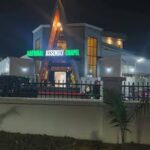By Folasade Akpan
The Legislative Network on Cancer (LNC) has called for the allocation of N5 billion to the Cancer Health Fund (CHF) in Nigeria’s 2026 budget to scale up access to treatment for indigent cancer patients.
Sen. Ibrahim Oloriegbe, Chairman of the Governing Board of the National Health Insurance Authority (NHIA) and a founding member of the LNC, made the appeal on Thursday in Abuja at the second Legislative Summit on Sustainable Cancer Care Financing and the formal launch of the LNC.
Oloriegbe emphasised that the proposed funding increase was essential due to Nigeria’s growing population and the corresponding rise in cancer cases.
“This is a key problem because of our population. So, the funding should increase,” he said.
Recalling his tenure as Chairman of the Senate Committee on Health in the Ninth Assembly, Oloriegbe noted that the CHF was initially established in the 2020 Appropriation Act with a N750 million allocation in 2021.
“However, subsequent funding has declined over the years.”
In his welcome address, Prof. Usman Aliyu, Director-General of the National Institute for Cancer Research and Treatment (NICRAT), highlighted the persistent inaccessibility and unaffordability of cancer care in Nigeria, particularly in rural areas.
Represented by Prof. Ali Gombe, he stated that the CHF currently operated through six Centres of Excellence (COEs), providing free treatment for indigent patients with breast, cervical, and prostate cancers.
“Though the programme is not without challenges, close to 2,000 patients have benefitted since its inception in 2021,” he said.
Aliyu identified inadequate funding as a major obstacle to scaling the programme and expanding coverage to more facilities and cancer types.
He also noted that for the first time, a Childhood Cancer Fund had been included in the national budget, with N150 million allocated to the CHF and N50 million specifically for pediatric cancer treatment in the 2025 budget.
“To this end, the LNC is an innovative step toward legislative engagement, oversight, and sustained commitment.
“Through this initiative, we can advocate for increased budgetary allocation, especially to the CHF,” he added.
Dr Iziaq Salako, Minister of State for Health and Social Welfare, stressed that common cancers such as breast, cervical, prostate, and colorectal remained highly prevalent in Nigeria, often diagnosed at late stages with poor outcomes.
Represented by his Senior Special Assistant (Technical), Dr Lolade Kehinde, Salako pointed to significant gaps in public awareness, screening access, affordability of care, and overall health system capacity.
He described the LNC’s launch as a strategic alliance that integrated legislation, advocacy, and oversight into Nigeria’s cancer control strategy.
“We appreciate the efforts of members of the National Assembly for their commitment to increasing appropriations for cancer control.
“With your support, we can prioritise cancer prevention and control, strengthen policies on tobacco control, HIV prevention, vaccination, and occupational health.
“We can also explore innovative financial models, including taxes on sugar, alcohol, and tobacco.”
In his presentation titled “Breast Cancer Disease Burden in Nigeria,” Prof. Emmanuel Ezeome said the primary driver of the increasing breast cancer incidence in Nigeria was population growth.
He noted that between 1990 and 2019, breast cancer cases in sub-Saharan Africa rose by 247 per cent, with Nigeria recording the highest increase.
Similarly, he said breast cancer-related deaths increased by 184 per cent, with Nigeria accounting for 24 per cent of the regional total.
Ezeome emphasised the importance of early detection, effective treatment access, and investment in health infrastructure as critical to reversing the rising cancer burden.
He called on stakeholders across sectors to support the development of cancer treatment centres, including radiotherapy units, MRI and PET scan facilities, SPECT machines, and advanced laboratories.
“It is our moral responsibility to contribute meaningfully rather than invest in ventures that do not serve public health,” he stated.
Rep. Amos Gwamina, Chairman of the LNC and House Committee on Health Institutions, reiterated the National Assembly’s commitment to prioritising cancer financing in the 2026 budget.
“We are going to do everything possible to ensure that funds are appropriated, monitored, and implemented.
“Oversight will be key. We are also committed to strengthening the NHIA and addressing out-of-pocket expenses,” he said.
Mr Ladi Hameed, General Manager of Roche Pharmaceuticals Nigeria, highlighted that a well-structured cancer care system would benefit the broader health sector.
“We won’t build hospitals only for cancer. The infrastructure can be used to treat many other diseases.
“If we get cancer care right, we will be solving several problems at once,” he said.
The News Agency of Nigeria (NAN) reports that the LNC is envisioned as a national platform for multi-sectoral collaboration among lawmakers, government agencies, the private sector, and civil society to address Nigeria’s rising cancer burden. (NAN)(www.nannews.ng)
Edited by Abiemwense Moru












